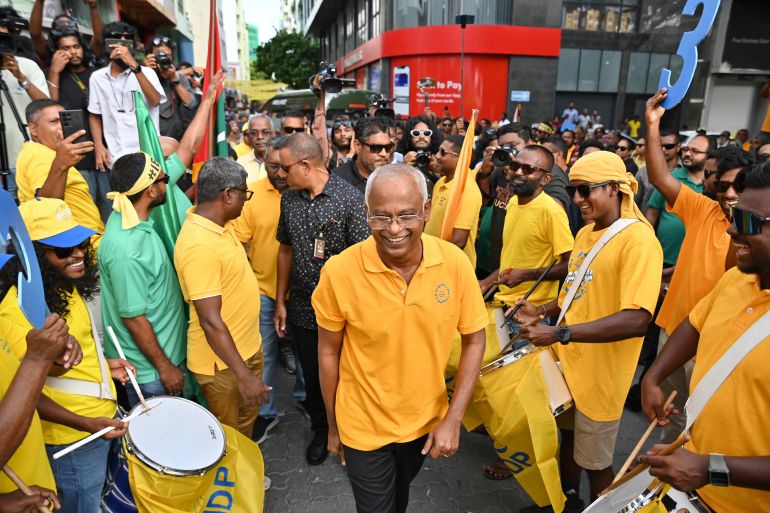In a high-stakes presidential run-off election, the Maldives is on the brink of making a decision that will not only shape the future of its democracy but also have far-reaching implications for its relations with neighboring giants, China and India. As voters in this idyllic Indian Ocean archipelago head to the polls, the outcome remains uncertain, hanging in the balance with the future of democracy and international alliances at stake.
China-India Rivalry: A Battle for Influence
This crucial election is poised to play a pivotal role in determining the power struggle for influence in the Maldives between China and India. Incumbent President Ibrahim Mohamed Solih, who has pursued an India-centric policy, has incurred substantial debt to New Delhi, bolstering the bilateral relationship between the two nations. In contrast, his opponent, Mohamed Muizzu, the former mayor of the capital, has advocated for closer ties with China during his tenure from 2013 to 2018 and currently seeks to diminish India’s influence in the Maldives.
As per the Baani Centre for International Policy, the Maldives’ debt to both China and India amounted to 26 percent of its GDP at the end of 2021. The outcome of this election is now a litmus test for the predictability of relations between the Maldives and its neighboring giants. While President Solih’s stance remains clear to both Beijing and New Delhi, Muizzu’s unexpected rise to prominence introduces an element of uncertainty into the equation, as his Progressive Party of Maldives (PPM)-led coalition pushes an “India Out” campaign, attempting to curtail New Delhi’s perceived influence.
Fears for Democracy: A Precarious Experiment
The change in government that hangs in the balance not only shapes the foreign policy of the Maldives but also the stability of its fledgling democracy. Critics argue that Muizzu, who served as a cabinet member under former President Abdulla Yameen, could potentially steer the nation back towards authoritarianism. During Yameen’s tenure, the Maldives witnessed a harsh crackdown on dissent, with opposition leaders jailed, journalists prosecuted, and a significant corruption scandal, diverting millions of dollars into bribes for judges, legislators, and watchdog institutions. The presence of groups affiliated with al-Qaeda and ISIS persisted unchecked.
Azim Zahir, a lecturer and research fellow in international relations and politics, voiced concerns, saying, “The Maldivian experiment with democratic politics is still very precarious.” He expressed unease about the future of democracy should Muizzu win the election.
However, Muizzu has pledged not to repeat the oppressive tactics of the past. “I do not support brutality,” he stated, assuring that his political opponents would have the opportunity for political activities.
A Crucial Disadvantage for Solih
President Solih has positioned this election as a battle between democracy and autocracy, yet he faces a significant disadvantage. His inability to secure the backing of third and fourth-placed candidates from the first round, particularly Ilyas Labeeb, who won seven percent of the vote, has left him in a precarious position. Labeeb represented the Democrats, a party founded by former President Mohamed Nasheed, who fell out with Solih after a bitterly contested presidential primary this year.
Nasheed and the Democrats have accused Solih’s government of failing to deliver on its 2018 campaign promises, including justice for the Maldives’ largest corruption scandal and addressing the al-Qaeda-linked killings. Additionally, they claim the government has used state-owned enterprises for patronage, influencing thousands of jobs and media outlets.
The outcome of the election remains uncertain as Solih enters the second round with a “significant disadvantage,” as noted by Ahmed Shaheed, a former Maldivian foreign minister. Shaheed predicts a tight contest, emphasizing that no one can confidently declare victory at this juncture.
As the people of the Maldives exercise their right to vote, the world watches with bated breath, cognizant that the repercussions of their choice extend far beyond their pristine shores, impacting the delicate balance between democracy and authoritarianism in the region and the geopolitical rivalry of two global powerhouses, China and India.















